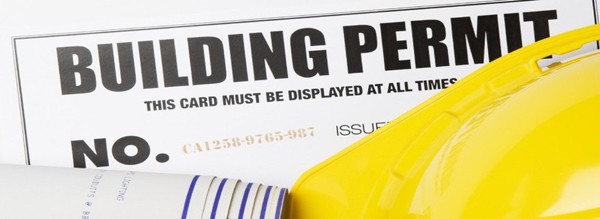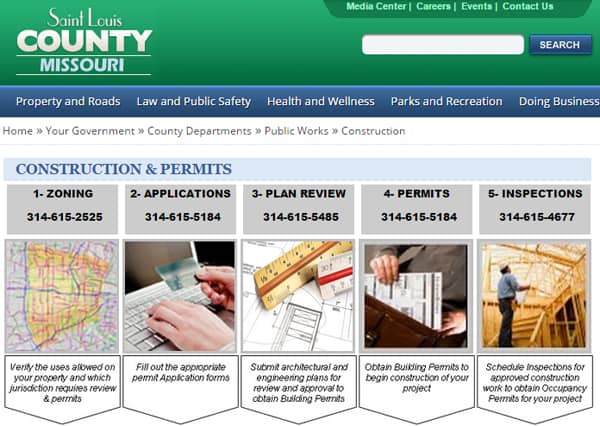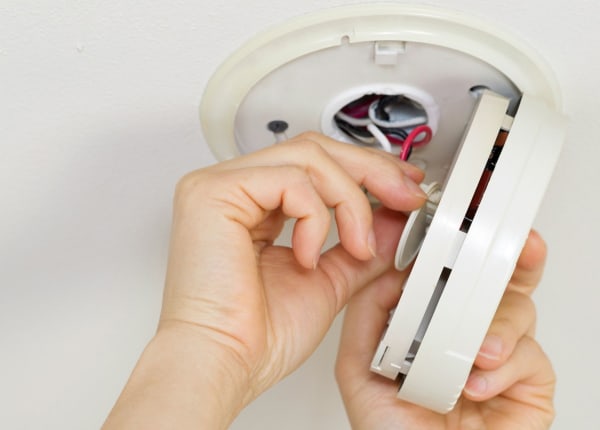When remodeling your home, you need to have the proper building and zoning permits. Professional remodeling companies take care of this process for the homeowner, while DIY projects can put homeowners through a potentially confusing maze of information. But it must be done.
Because building codes and permits are of great interest to St. Louis homeowners, Scott Mosby recently talked with two members of the St. Louis County office of Construction and Permits on his KMOX radio program, The Mosby Building Arts Home Improvement Show.
Dave Castle is the Assistant Division Manager over permit applications and planning. Dan Dreisewerd is the Code Enforcement Division Manager. Here we share important parts of their conversation.
Why Building Codes Exist
SCOTT: At my remodeling company, we are often asked by clients why certain building codes exist, and why they have to do it. To be blunt, the more people who died or were injured due to poor construction or lax codes, the stricter the codes became. It’s about safety and comfort for homeowners, and paying out less on damages for insurance companies, which also affects your insurance rates.
DAN: Some sort of disaster is what typically drives most code improvements or upgrades. For instance, the collapse of the World Trade Center led to new requirements for skyscrapers to have additional stairs above a certain height, better protection on stair enclosures, and easier communication networks for firefighters.
Codes have improved through the years. I have a St. Louis County municipal code book from 1947 and it’s about the size of two billfolds and a half inch thick. Compare that to today’s code book that’s 2 inch thick for residential construction! We’ve come a long way to make safer structures.
The Permit Application Process
SCOTT: Say a homeowner wants to build a deck. Walk me through the process of how they do this with your office.
DAVE: First, check to learn if your town is under our jurisdiction. Here’s the website to visit for that information.
They would bring their plans for the deck to our office and fill out the appropriate application. Plans can be done by the homeowner or the contractor. We offer a while-you-wait plan review service for smaller residential projects, roughly up to 400 square feet. They can theoretically secure their permit the same day they file the application.
As part of the process, the plans are sent to the zoning office to make sure the deck they are proposing meets the set-back and other zoning requirements. If it doesn’t meet zoning requirements, you can apply for a variance. Then it’s turned over to the building plan reviewer who checks the structural aspects of the deck to make sure it’s safe.
For any questions about the process or specifics on requirements, do call our office at 314.615.5184, or email us at [email protected].
Hard-Wired Smoke Detectors
SCOTT: We can buy battery-operated smoke detectors and put them all over the house, but what if you forget to change the batteries regularly? What is the difference between the battery and hard-wired detectors?
DAVE: Any smoke detector is better than none, so if you have an existing home with battery-operated detectors, you are reasonably protected as long as you are diligent about keeping the batteries fresh. Code now requires detectors within each bedroom, outside of each bedroom in the hallways, and detector on every level of the house.
Under current code there’s a retroactive provision that if you’re doing remodeling within the interior of your house – be it a kitchen renovation, finished basement – you are required by code to put in inter-connected smoke detectors. Interconnected detectors are so if one goes off in the basement they go off throughout the entire house so no matter where you are you can hear them. There are detectors on the market that talk to each other without hardwiring, and those are often acceptable for code inspection.
SCOTT: Hard-wired smoke detectors have been written into the building code for quite some time, but it feels like it’s more recently enforced with remodeling projects.
DAN: It’s been in the code for a long time as pertaining to new home construction. For the past 10 years or so, it’s a requirement that anytime you renovate the interior of your home you have to put smoke detectors in to comply with current code. There are homes built in the 1980s and 1990s with detectors only in the hallway outside bedrooms, and that did comply with code at that time. But new code requires more, for your safety.
One issue about hard-wired detectors that is a bit of a surprise to homeowners is the cost of installing and connecting those detectors, particularly on the levels where you’re not renovating. But code says if you have access to the levels below and above – which can be unfinished basement or attic – you have to install hard-wired detectors.
Avoid Additional Expense and Delay
The St. Louis County website has a Citizens Access Portal to answer questions about permits and the status of a permit application. You can also check on any home renovation to learn if it’s done properly with permits at this web page.
This transparency means there is also greater potential to suffer the consequences of non-permit work than ever before. If non-permit work is found in a home – be it during construction or when it’s time to sell – you will incur the cost of correcting the issue so it’s code compliant.
When a project is planned properly, you know in advance about code requirements that may add to the project budget. The planners and architects at Mosby Building Arts maintain a current database of building code requirements for all St. Louis, Missouri municipalities, and automatically apply these to construction drawings that are submitted for permits.
Mosby stays on top of all the details that keep you safe in your home because all work is performed to and beyond the local building codes. For more information about building codes and permits for a remodeling project you’re considering, call the Mosby office at 314.909.1800 or contact them here.







